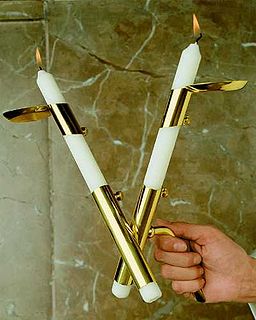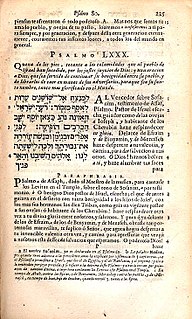Related Research Articles

Gluttony means over-indulgence and over-consumption of food, drink, or wealth items, particularly as status symbols.

The epiclesis is the part of the Anaphora by which the priest invokes the Holy Spirit upon the Eucharistic bread and wine in some Christian churches.

The word thou is a second-person singular pronoun in English. It is now largely archaic, having been replaced in most contexts by you. It is used in parts of Northern England and in Scots. Thou is the nominative form; the oblique/objective form is thee, the possessive is thy (adjective) or thine and the reflexive is thyself. When thou is the grammatical subject of a finite verb in the indicative mood, the verb form typically ends in -(e)st, but in some cases just -t, although in some dialects of Old English, this verb form ended in -s, hence the Quaker habit of using what looks like the third person form of the verb with "thee" as the subject.

Trial by ordeal was an ancient judicial practice by which the guilt or innocence of the accused was determined by subjecting them to a painful, or at least an unpleasant, usually dangerous experience. The test was one of life or death, and the proof of innocence was survival. In some cases, the accused was considered innocent if they escaped injury or if their injuries healed.

The Alphabet of ben Sirach is an anonymous text of the Middle Ages inspired by the Hellenistic work known as the Sirach. Its date of authorship is estimated to have been anywhere between 700 and 1000 CE. It is a compilation of two lists of proverbs, 22 in Jewish Babylonian Aramaic and 22 in Mishnaic Hebrew, both arranged as alphabetic acrostics. Each proverb is followed by a Haggadic commentary. The work has been characterized as satire, and it contains references to masturbation, incest and flatulence. The text has been translated into Latin, Yiddish, Judaeo-Spanish, French and German. A partial English translation appeared in Stern and Mirsky (1998).

Richard Corbet was an English clergyman who became a bishop in the Church of England. He also left behind a reputation as a humorist and as a poet, although his work was not published until after his death and in unreliable editions.
The Laodicean Church was a Christian community established in the ancient city of Laodicea. The church was established in the Apostolic Age, the earliest period of Christianity, and is probably best known for being one of the Seven churches of Asia addressed by name in the Book of Revelation. Warm followers, those who believe but do not walk according to the Spirit of the Lord

Pavle Orlović is a semi-mythological hero of the Kosovo cycle of Serbian epic poetry; he was a Serbian knight, one of the military commanders under Prince Lazar that fell at the Battle of Kosovo (1389) against the Ottoman Empire. According to folklore, Orlović was the son of voivode Vuk Orle, the Lord of Soko Grad on the Drina. After the death of Stephen Uroš V the Weak, Orlović held the mining town of Novo Brdo, as well as his father's possessions on Mount Rudnik in central Serbia.

"John the Revelator" is a traditional gospel blues call and response song. Music critic Thomas Ward describes it as "one of the most powerful songs in all of pre-war acoustic music ... [which] has been hugely influential to blues performers". American gospel-blues musician Blind Willie Johnson recorded "John the Revelator" in 1930 and subsequently a variety of artists have recorded their renditions of the song, often with variations in the verses and music.

The Blessing of the Throats is a sacramental of the Roman Catholic Church, ordinarily celebrated on February 3, the feast day of Saint Blaise of Sebaste. It also celebrated in some of the Eastern Catholic Churches, and in parishes of the Anglican Communion on the same day as a commemoration.
Thanksgiving after Communion is a spiritual practice among Christians who believe in the Real Presence of Jesus Christ in the Communion bread, maintaining themselves in prayer for some time to thank God and especially listening in their hearts for guidance from their Divine guest. This practice was and is highly recommended by saints, theologians, and Doctors of the Church.
Kerby, whose Christian name is not known, was a man condemned by the Justices and executed by burning at the stake in Ipswich, Suffolk, for his Protestant beliefs, along with Roger Clarke. He is numbered among the Ipswich Martyrs. He died for denying the Roman Catholic doctrine of transubstantiation of the Host.

The Scapular of Saint Michael is a Roman Catholic devotional scapular associated with Michael, the Archangel and originated prior to 1878. It was formerly controlled by the now defunct Archconfraternity of the Scapular of Saint Michael.

"Te Splendor" is a Roman Catholic hymn dedicated to Saint Michael, the Archangel. The hymn derives its name from the fact that in Latin it begins with the words: Te splendor et virtus Patris. The hymn is included in the Raccolta collection of prayers with indulgences, and its authorized translations.

Psalm 80 is the 80th psalm in the biblical Book of Psalms.

Spiritual Communion is a Christian practice of desiring union with Jesus Christ in the Holy Eucharist. It is used as a preparation for Holy Mass and by individuals who cannot receive Holy Communion.

Kumayl bin Ziyad an-Nakha'i was among the most loyal companions of Imam Ali Ibn Abi Talib. Moreover, Kumayl occupies a prominent position in Shia Islam. Converting to Islam during the time of Islamic prophet Muhammad, he rose to a position of prominence during the caliphates of Uthman and Ali. In the caliphate of Ali, Kumayl flourished and served him in the most disciplined of ways. However, he is recognized for his pious and humble nature as well as preserving Imam Ali's teachings. Kumayl is best known for the du'a (supplication) of Prophet Khidr, which is commonly known by the name du'a Kumayl.

Edwin James Milliken, was a Punch editor, journalist, satirical humorist and poet. He is best known for his oft-quoted poem "Death and his brother sleep", notably quoted by Winston Churchill in the prelude to World War II when he felt that parliament was not taking the prospect of a war against Hitler seriously enough. He produced a series of comic poems published as The 'Arry Papers between 1874 and 1897. He worked as journalist on the London Figaro in 1872 and joined Punch in 1877. His creation of 'Arry, a bombastic Cockney, resulted in a successful series of poems which were hailed for their phonetic precision. Milliken described 'Arry as "really appalling. He is not a creature to be laughed at or with." In 1883 he published The Modern Ars Amandi.

The Te Deum in D major, "Queen Caroline" is a canticle Te Deum in D major composed by George Frideric Handel in 1714.
The Begatting of the President is a satirical album narrated by Orson Welles, summarising the presidency of Lyndon B. Johnson and the election of 1968, leading up to the election of Richard Nixon, delivered in the style of Biblical verse.
References
- ↑

- 1 2 Blackstone, Sir William (1769). Commentaries on the laws of England. IV. 339. "Corsned, or morsel of execration: being a piece of cheese or bread, of about an ounce in weight, which was consecrated with a form of exorcism; desiring of the Almighty that it might cause convulsions and paleness, and find no passage, if the man was really guilty; but might turn to health and nourishment, if he was innocent."
- ↑ 'Laws of Ethelred ix. 22 in Thorpe I. 344'. "corsned". Oxford English Dictionary (3rd ed.). Oxford University Press. September 2005. (Subscription or UK public library membership required.)
- ↑ Thorpe, Benjamin (1865). "Ordel". Diplomatarium anglicum aevi saxonici . p 659.
- ↑ Ecclesiastical Laws of Canute the Great, Article 5:
- English: "And if a friendless servant of the altar be charged with an accusation, who has no support to his oath, let him go to the corsned, and then thereat fare as God will, unless he may clear himself on the housel." Roundell Palmer, 1st Earl of Selborne (1892). Ancient Facts and Fictions concerning Churches and Tithes . London: Macmillan and Co. Appendix E, p 340.
- Latin: "Si quis altari ministrantium accusetur, et, amicis destitutus, consacrementales non habeat, vadat ad judicium, id est ad panem conjuratum, quod Anglice dicitur corsned, et fiat sicut Deus velit; nisi super sanctum corpus Domini permittatur ut se purget." Great Britain (1840). "Legis Regis Cnuti", v. Ancient Laws and Institutes of England . Printed by G. E. Eyre and A. Spottiswoode, printers to the Queen's Most Excellent Majesty. p 523.
- 1 2 D'Israeli, Isaac. "Trials and Proofs of Guilt in Superstitious Ages". Curiosities of Literature.
- 1 2 Burn, Richard and John Burn (1792). A new law dictionary: intended for general use, as well as for gentlemen of the profession. By Richard Burn, ... And continued to the present time by John Burn, Esq. his son, ... In two volumes. Vol. 1. London. pp 231-232.
- ↑ Lingard, John (1810). The antiquities of the Anglo-Saxon Church . Newcastle : Printed by E. Walker, sold by J. Booker and Keating. pp 310-311.
- 1 2 3 Snell, Frederick John. "The Judgment of the Morsel". The Customs of Old England . pp 137-138.
- ↑ Thomson, Richard (1828). Illustrations of the History of Great Britain , vol 1. Edinburgh: Constable & Co. p 166.
- 1 2 Cowell, John (1701). "Corsned". The interpreter of words and terms, used either in the common or statute laws of this realm, and in tenures and jocular customs... London. 351pp. p 95.
- ↑ E. Cobham Brewer (1894). "Ingulph's 'Croyland Chronicle'". Dictionary of Phrase and Fable. "Proved to be a forgery by H. J. Riley in the Archaeological Journal, 1862. He dates the forgery between 1393 and 1415, and attributes it to Prior Richard of Croyland and Sergeant William Ludyngton."